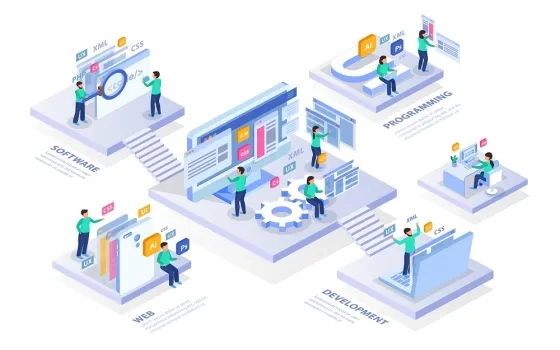In the ever-evolving landscape of healthcare, technology is not just a trend but a necessity. Custom healthcare software has emerged as a key driver of change, enhancing patient care, improving operational efficiency, and revolutionizing the way healthcare organizations operate. However, investing in custom healthcare software is a strategic decision that often comes with a significant financial commitment. To evaluate the true value of this investment, it's crucial to understand the return on investment (ROI) that custom healthcare software can bring. In this comprehensive analysis, we'll delve into the various facets of the ROI of custom healthcare software.
The Current State of Healthcare Software
The healthcare sector is under constant pressure to provide higher quality care while managing costs efficiently. With the advent of electronic health records (EHRs), telemedicine, and patient engagement solutions, the healthcare industry has made significant strides in leveraging technology to meet these demands. However, the limitations of off-the-shelf software have become apparent, leading to a growing interest in custom solutions.
Custom healthcare software is tailored to the unique needs of healthcare organizations. It's designed to enhance patient care, improve healthcare workflows, and ensure compliance with industry regulations. While the upfront costs of custom software development can be substantial, it's essential to evaluate the long-term benefits it offers.
Analyzing the ROI of Custom Healthcare Software
1. Cost Savings and Efficiency Gains
One of the most significant advantages of custom healthcare software is the potential for cost savings and efficiency gains. When software is customized to fit an organization's specific needs, it can streamline processes, reduce administrative overhead, and eliminate redundant tasks. Here's how it can lead to cost savings:
-
Automated Workflows: Custom software can automate routine tasks, such as appointment scheduling, billing, and claims processing. This reduces the need for manual labor and decreases the likelihood of errors.
-
Streamlined Patient Data Management: Electronic health records (EHRs) and patient data management systems help healthcare providers access patient information quickly, reducing the time spent searching for paper records.
-
Telemedicine Efficiency: Custom telemedicine solutions enhance remote patient consultations, reducing the need for in-person visits and associated costs.
-
Inventory and Resource Management: Custom software can help manage medical supplies, ensuring that stock levels are optimal and minimizing waste.
-
Data Security: Robust data security features in custom software reduce the risk of data breaches and potential legal and financial ramifications.
2. Patient Satisfaction and Retention
Custom healthcare software isn't just about improving internal processes; it also plays a significant role in enhancing the patient experience. Higher patient satisfaction levels translate into increased patient retention, attracting new patients through positive word-of-mouth. Some of the ways in which custom software can boost patient satisfaction include:
-
Access to Information: Custom patient portals and mobile apps provide patients with easy access to their medical records, test results, and appointment schedules.
-
Appointment Scheduling: Custom appointment scheduling systems ensure that patients can book appointments online, reducing waiting times and improving the overall experience.
-
Communication: Custom software can facilitate secure patient-provider communication, allowing patients to ask questions and receive timely responses.
-
Personalized Care: Custom software can enable personalized care plans, tailoring treatment and support to individual patient needs.
3. Revenue Growth and Competitive Advantage
Custom healthcare software can also contribute to revenue growth and provide a competitive advantage in the healthcare industry. It allows healthcare organizations to offer services that differentiate them from competitors and attract more patients. Some ways in which custom software can drive revenue growth include:
-
Telemedicine Services: The ability to offer telemedicine services can extend the reach of healthcare providers, attracting patients from a wider geographical area.
-
Specialized Services: Custom software can support specialized medical services, such as remote patient monitoring, telepsychiatry, and chronic disease management.
-
Cross-Selling and Upselling: Custom patient portals can promote additional services, such as wellness programs, health assessments, and preventive care, generating additional revenue streams.
-
Improved Billing and Claims Processing: Custom software can optimize billing and claims processing, ensuring that healthcare providers receive timely payments.
-
Data Analytics: Custom software can leverage data analytics to identify revenue opportunities, such as targeted marketing campaigns and service expansions.
4. Regulatory Compliance and Risk Mitigation
Healthcare is one of the most regulated industries, with strict standards and regulations governing data security, privacy, and patient care. Custom healthcare software can help organizations stay compliant with these regulations, reducing the risk of fines, legal actions, and reputational damage. Here's how custom software contributes to regulatory compliance and risk mitigation:
-
HIPAA Compliance: Custom software can be developed with HIPAA (Health Insurance Portability and Accountability Act) in mind, ensuring the secure handling of protected health information (PHI).
-
GDPR Compliance: For organizations operating in regions covered by the General Data Protection Regulation (GDPR), custom software can be designed to adhere to these standards, protecting patient data and privacy.
-
Data Security: Custom software can implement robust data security measures, reducing the risk of data breaches and ensuring that patient data remains confidential.
-
Audit Trails: Custom EHR systems can maintain detailed audit trails, helping organizations track who accessed patient records and when, which is essential for compliance and risk mitigation.
5. Scalability and Adaptability
The healthcare industry is in a constant state of change, with evolving patient needs and technological advancements. Custom healthcare software offers scalability and adaptability, ensuring that organizations can grow and respond to these changes. Benefits of scalability and adaptability in custom software include:
-
Expansion: Custom software can support the opening of new healthcare facilities, making it easier to integrate them into the existing system.
-
Integration: Custom software can be seamlessly integrated with other healthcare systems and technologies, such as laboratory information systems, radiology systems, and wearable health devices.
-
Upgrades: Custom software can be upgraded to leverage the latest technological advancements, ensuring that healthcare organizations remain competitive.
-
Tailored Features: Custom software can include features that address the specific needs of different departments within a healthcare organization, from radiology to cardiology.
A Real-World Example: The Emorphis Technologies Case Study
To illustrate the real-world impact of custom healthcare software on ROI, let's examine a case study: Emorphis Technologies. Emorphis Technologies is a global IT services company known for its expertise in healthcare software development.
Challenges Faced by Healthcare Providers
Before working with Emorphis, a prominent healthcare organization was grappling with several challenges:
-
Manual Processes: The organization relied on manual processes for appointment scheduling, billing, and patient data management, resulting in inefficiencies and errors.
-
Data Security Concerns: The healthcare organization was concerned about data security, especially with the increasing prevalence of data breaches in the industry.
-
Patient Experience: Patients often expressed dissatisfaction with the appointment booking process and the time it took to access their medical records.
Custom Solutions from Emorphis Technologies
Emorphis Technologies partnered with the healthcare organization to develop custom software solutions. They created:
-
Appointment Scheduling System: An automated appointment scheduling system that allowed patients to book appointments online, reducing the administrative burden on staff and improving the patient experience.
-
Electronic Health Records (EHR) System: A custom EHR system that streamlined patient data management, making it easier for healthcare providers to access records quickly and securely.
-
Data Security Measures: Robust data security measures were implemented, ensuring compliance with HIPAA regulations and protecting patient data from potential breaches.
-
Patient Portal: A patient portal that provided secure access to medical records, test results, and communication with healthcare providers.
Results
The implementation of custom healthcare software from Emorphis Technologies yielded significant results:
-
Cost Savings: The automation of appointment scheduling and billing processes reduced administrative overhead, leading to substantial cost savings.
-
Patient Satisfaction: The patient portal and improved data access resulted in higher patient satisfaction levels and increased patient retention.
-
Data Security: Robust data security measures helped the healthcare organization avoid data breaches, ensuring regulatory compliance and reducing the risk of legal and financial repercussions.
-
Efficiency Gains: Streamlined processes and electronic health records improved operational efficiency, allowing the organization to see more patients and reduce wait times.
-
Revenue Growth: Enhanced patient satisfaction and access to services led to increased revenue and a competitive edge in the healthcare industry.
-
Scalability: The custom solutions could be easily adapted and scaled to support the opening of new healthcare facilities and the integration of new technologies.
This case study demonstrates the substantial ROI achieved through custom healthcare software solutions provided by Emorphis Technologies. By addressing the specific challenges faced by the healthcare organization and tailoring solutions to meet those needs, Emorphis Technologies significantly improved operational efficiency, patient satisfaction, data security, and revenue.
Conclusion
Custom healthcare software is not just an expense; it's an investment that can yield substantial returns. The comprehensive analysis of ROI presented here highlights the potential benefits of custom software, including cost savings, patient satisfaction, revenue growth, regulatory compliance, and adaptability to changing industry dynamics. The case study of Emorphis Technologies further emphasizes the real-world impact of custom healthcare software on a healthcare organization's success.
In an era where the healthcare industry faces unprecedented challenges, custom healthcare software offers the means to improve patient care, enhance operational efficiency, and stay competitive in a rapidly evolving landscape. While the initial investment in custom software development may be significant, the long-term value it provides, in terms of ROI, far outweighs the costs. Custom healthcare software is not just a tool; it's a strategic asset for healthcare organizations looking to thrive in the digital age.















